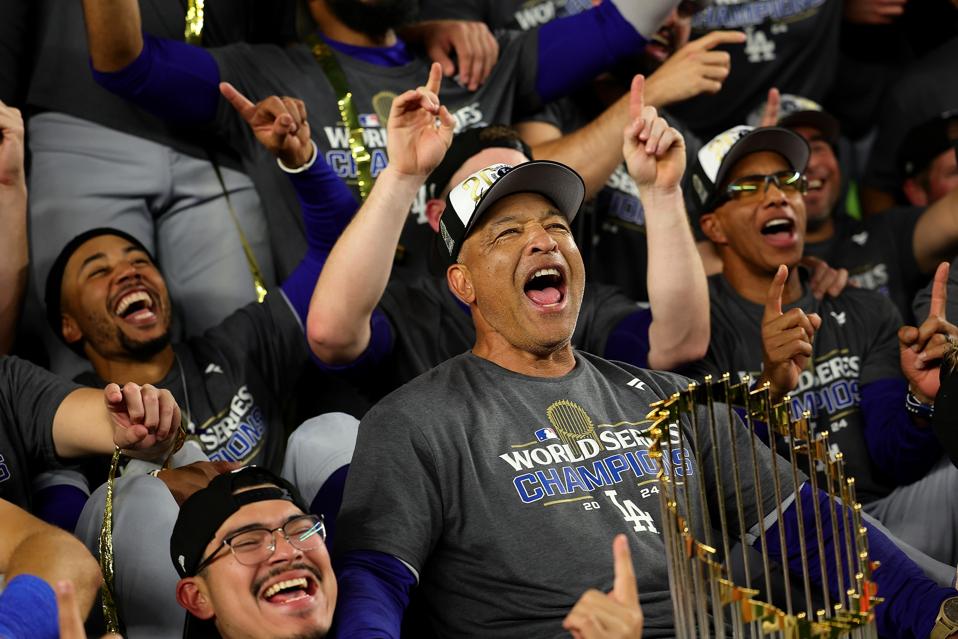You could hear the complaints from fans building as soon as the Dodgers tied it up in the ninth inning Saturday night. There were many, but they all sounded something like this: Oh great, the best team money could buy is going to win again!
On Saturday, fans of the Toronto Blue Jays saw their first World Series title since 1993 slip from their fingers in the late innings of Game Seven. After enjoying a three-run lead thanks to a homer by Bo Bichette, the Jays saw their cushion eventually fade to nothing.
Ultimately Toronto lost in the eleventh, 5-4. The L.A. Dodgers with their $321,287,291 payroll, billionaire owners and swath of coaches and computers won the most coveted prize in baseball for a second year in a row. Woo-hoo, right? Well, maybe not.
It’s easy to wave away the Dodgers’ victory. Too easy is a too easy narrative. If you think rationally (unlike a fan) you can see that the team wasn’t fated to win. Instead, they were pushed to great lengths and they overcame them—not with dollar signs but with guts and resilience.
In fact, the Dodgers roster wasn’t even the most expensive in baseball—the New York Mets own that title. Throughout history there have been plenty of high-priced teams to take MLB fields. But they don’t always win. (The New York Yankees haven’t won a title since 2009.)
The Mets were also No. 1 in payroll in 2024, followed by the Yankees, but it was the Dodgers who won the World Series last season with a payroll more than $50 million less than the Mets. It’s easy to buy talent. But it’s not always easy to win with it.
“We’re in a big market. We’re expected to win. Our fans expect us to win. I can’t speak to what revenue we’re bringing in, but our ownership puts it back into players, a big chunk of it,” said Dodgers manager Dave Roberts after Saturday’s win. “That’s the way it should be with all ownership groups.”
In the NBA, teams with the best talent wouldn’t look for just anyone to coach them. They’d seek out Phil Jackson. He was the person who could work with the best players—including their egos and big salaries—and get results.
Jackson was able to win 11 rings as a coach thanks to getting the best out of the likes of Dennis Rodman, Scottie Pippen, Michael Jordan, Kobe Bryant, Shaquille O’Neal and others. On paper, it seems like an easy task. In practice, it’s a constant balancing act.
“You can have the perfect mix of talent and the best system of offense in the game,” Coach Jackson famously said. “You can devise a foolproof defensive strategy and prepare your players for every possible eventuality. But if the players don’t have a sense of oneness as a group, your efforts won’t pay off.”
During the 2025 World Series, the pivotal Game Three was anyone’s to win. The matchup went a whopping 18 innings. Batters got upwards of nine plate attempts throughout the contest. But it was the Dodgers who eeked out a victory thanks to a run in the eighteenth.
Yes, the Dodgers represented the second-highest payroll in baseball this season. Yes, they bought a lot of talent (players like Freddie Freeman, Shohei Ohtani and World Series MVP Yoshinobu Yamamoto) but they won that game because of a skill you can’t always measure.
Resilience.
In business, we see the need for resiliency often. Companies like McDonald’s, Coca-Cola, Nike and Apple have had to constantly reinvent themselves in order to maintain their perch at the within their industry. On the other side of the spectrum, small businesses working to make a name for themselves often need to leap hurdle after hurdle to progress forward.
But just as with the Dodgers, it’s the creativity of reinvention that pushed Apple or your favorite neighborhood boutique to new heights. To win, you often have to spend. You also have to do a lot more than that. You have to rise to every challenge—even sometimes in the eighteenth.
Writing in Forbes, contributor Mike Campbell explains: “Resilience is the ability to confidently navigate disruption by making informed decisions and executing with speed and precision. Resilient organizations understand their critical functions, anticipate where things could break and proactively build enterprise-wide strength.”
In other words: You don’t navigate the eighteenth inning with dollar signs. You do it with something else entirely.
That’s what the Dodgers bring to the table. And others are noticing.
“You see free agents and you see other guys, they want to be a part of something that is built to last,” said pitcher and team icon Clayton Kershaw after the Game Seven win. “We don’t want to be one-hit wonders as free agents. You know when you sign up to be a Dodger that you’ll be in these situations.”

